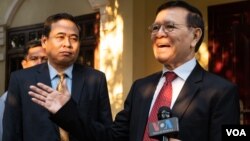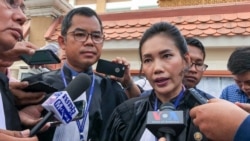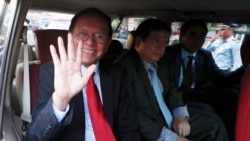The Council of Judges in the Kem Sokha trial agreed on Wednesday afternoon to accept the defense’s 1-hour video clip of Kem Sokha’s alleged 2013 “treason” speech as evidence going forward, but was unclear if the 2-minute shorter clip, used to justify his arrest, would still be considered during the rest of the trial.
The judges’ ruling came after a three-hour session Wednesday afternoon, where the prosecution and defense clashed over differences between a 2-minute clip played last week by the prosecution and a 1-hour section of the same Kem Sokha speech in Australia in 2013, played in court on Wednesday by the defense.
Despite multiple questions being raised about the authenticity of the video clips and accusations of splicing and selective editing, there was no forensic analyst present in court to give an expert opinion nor was any forensic evidence presented by either side.
The government lawyers only said that the shorter video had been submitted to the court as part of an investigation report from the Interior Ministry’s Anti-Terrorism Department.
“The prosecution requests to use the longer video as evidence from now on,” deputy prosecutor Plang Sophal said in court.
With this development, it is unclear if the 2-minute video, which was posted by the government’s Press Quick Reaction Unit, minutes after Kem Sokha’s arrest in September 2017 and later used as justification for his arrest, will play a role in the trial moving forward.
As the trial resumed Wednesday afternoon, Presiding Judge Kuy Sao ruled that 34 pieces of evidence submitted by the defense in the morning session would be admissible, but that the prosecution and government lawyers needed time to examine all the evidence before it could be presented in court.
The court then moved on to the two video clips in question, with the defense playing the longer video clip in court, which, they said, showed that the shorter clip was edited and spliced to alter the opposition leader’s words.
Kem Sokha and his lawyers have maintained that the shorter video clip was misleading and that the altering of the audio leaves out contextual information the opposition leader gives before, in between and just after the sections used in the shorter 2-minute clip.
As the hearing resumed, both the long and short versions of the clip were played. The defense had text banners at the bottom of the video to indicate which sections of the 1-hour clip had been used in the shorter clip.
The defense said that two sections of the 1-hour video – one around 105 seconds and the other 31 seconds – had been edited together. However, around two minutes between these two sections had been left out, as well as a few words, such as “dictator” and “dictator in Cambodia.”
In the first section, Kem Sokha talks about his trip to the U.S. when he was first elected to parliament in 1993 and advice he received to leave politics and focus on grassroots activism. This, he said in the video, led to his starting the Cambodian Center for Human Rights. In this section, the word “dictator” was edited out from the audio, as Kem Sokha talks about how to deal with authoritarian governments.
In the second section of the video, he talks about the help he received from experts and how he was asked to consider the Yugoslavia model and the removal of Slobodan Milosevic, referring to the former Serbian and Yugoslavian leader who resigned amid popular protests following disputed elections. In this section too, the words “dictator in Cambodia” were deleted.
However, in between these two sections, Kem Sokha is seen in the video talking about how to deal with dictatorships, which, he said, were powerful and hard to depose. Using an analogy about stones and sticks, he said it was unwise to bang one’s head against the stone – the stone being a reference to a dictatorship – and instead, it was better to use a stick to move the stone.
He also said in the deleted section that he instead chose to train people through democratic means for change.
Kem Sokha’s lawyers argued in court that this section showed that he was arguing for a non-violent change of government in Cambodia, through grassroots activism, and that deletion of the middle section could make it seem like he wanted a violent uprising.
“But when you see the short video, the purpose of the video seems as if my client is [talking about] using violence,” said Chan Chen, a lawyer for Kem Sokha.
The prosecution and government lawyers both agreed that the short video had been edited from the longer video. Deputy prosecutor Plang Sophal said that 99 percent of the transcript provided by the defense for the longer video clip was accurate.
He added that Kem Sokha had accepted he was in the video and it was his voice, but did not address Sokha’s contention that edited 2-minute video was out of context and had a different meaning.
“The 2-minute video is taken from the 1 hour 3 minutes video,” Plang Sophal said. “What is in the short video, the long video also has the same.”
Government lawyer Ky Tech agreed with the prosecution and said that Kem Sokha had agreed on multiple occasions during the investigation period, even right after his arrest on September 3, 2017, that he was the person speaking in the video.
At the end of the hearing, Presiding Judge Kuy Sao said that the prosecution had agreed to use the longer video during the rest of the trial. The hearings will resume on Thursday.










